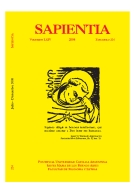Por favor, use este identificador para citar o enlazar este ítem:
https://repositorio.uca.edu.ar/handle/123456789/4241| Título: | On the origin and foundation of the concept "The Person” metaphysical realism on interpersonal recognition | Autor: | Nusser, Karl-Heinz | Palabras clave: | Spaemann, Robert, 1927-; Tomás de Aquino, Santo, 1225?-1274; Boecio, ca. 475-524; RACIONALIDAD; ALMA; ESENCIA; INTELECTO; INTENCIONALIDAD; SUBSTANCIA | Fecha de publicación: | 2008 | Editorial: | Pontificia Universidad Católica Argentina. Facultad de Filosofía y Letras | Cita: | Nusser, K. H. On the origin and foundation of the concept The Person metaphysical realism on interpersonal recognition [en línea]. Sapientia. 2008, 64 (224). Disponible en: https://repositorio.uca.edu.ar/handle/123456789/4241 | Resumen: | Resumen: De acuerdo con el autor, la capacidad del alma de conocerse a sí misma está en la raíz del problema de la persona. Más aún, el entendimiento deber ser interpretado antológicamente como una actividad del alma. Se lleva a cabo un análisis del concepto de persona en algunos filósofos medievales y modernos. También hay referencias a pensadores contemporáneos. El autor sostiene que la noción que Spaemann introduce, considerando la intencionalidad como meramente un sentimiento o negatividad, es insuficiente. El mencionado sentimiento subjetivo es idéntico al concepto de ‘intuición experienciante’ en la fenomenología; pero es insuficiente para permitirnos comprender la esencia de la persona como una entidad espiritual. El autor afirma que cada ser humano debería ser reconocido, no sólo como una creatura racional, sino también como persona, en especial cuando nos referimos a este ser humano o a esta alma. Agrega que las consecuencias prácticas de esta perspectiva son de gran importancia. Abstract: According to the author, at the root of the problem of ‘the person’ lies the concrete soul’s ability to know itself. Furthermore, the intention of ‘understanding’ must be ontologically interpreted as an activity of the soul. An analysis of the concept ‘person’ and other related notions in some relevant medieval and modern philosophers is carried out. There are also references to contemporary thinkers. The author claims that the notion that Spaemann introduces, considering intentionality merely to be a subjective feeling or negativity, is insufficient. The aforesaid subjective feeling is identical with the concept of ‘experiencing intuition’ in phenomenology, but it is insufficient to enable one to understand the essence of ‘the person’ as a spiritual being. The author states that each and every human being should not only be acknowledged as a rational creature but also as ‘a person’, in particular when we refer to this human being or this soul. He adds that the practical consequences of this perspective are of utmost importance. |
URI: | https://repositorio.uca.edu.ar/handle/123456789/4241 | ISSN: | 0036-4703 | Disciplina: | FILOSOFIA | Derechos: | Acceso Abierto | Fuente: | Versión original impresa en Sistema de Bibliotecas UCA: Sapientia Vol. LXIV Tomo XLVII, Nº 224, 2008. |
| Aparece en las colecciones: | SAP - 2008 Vol LXIV nro. 224 |
Ficheros en este ítem:
| Fichero | Descripción | Tamaño | Formato | |
|---|---|---|---|---|
| on-origin-foundation-concept-person.pdf | 185,21 kB | Adobe PDF |  Visualizar/Abrir |
Visualizaciones de página(s)
136
comprobado en 30-abr-2024
Descarga(s)
375
comprobado en 30-abr-2024
Google ScholarTM
Ver en Google Scholar
Este ítem está sujeto a una Licencia Creative Commons

